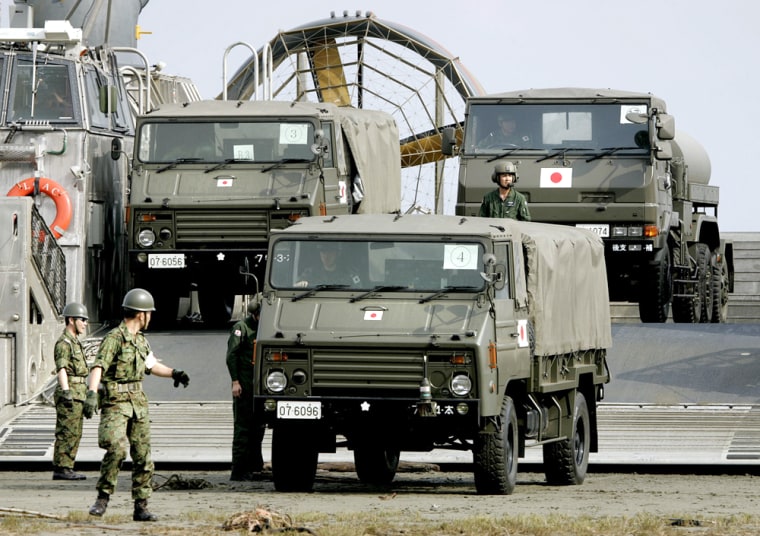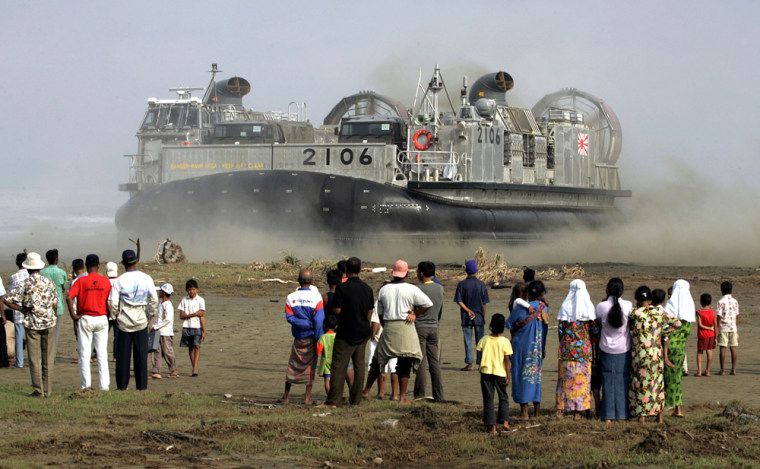Awe-struck villagers watched as two hovercraft landed on a beach Thursday in tsunami-devastated Aceh province, carrying Japanese troops in their largest overseas relief effort.
The Japanese troops will try to fill the gap left when U.S. forces scale back their relief operations.
Indonesian authorities said they planned to relocate 400,000 refugees in Aceh from squalid camps to temporary homes before the end of February.
“It’s critical to put all the internally displaced people in barracks, where we can serve them better rather than them being in tents,” said Budi Atmaji, who is leading the government’s relief effort.
He said the government also aims to remove all remaining corpses and complete its cleanup of the debris-filled streets of the provincial capital, Banda Aceh, by the end of next month.
Rebels gain autonomy offer
Indonesia’s president, meanwhile, offered autonomy to separatist rebels in Aceh province if they agree to a cease-fire in peace talks scheduled to begin Friday. A rebel leader rejected the autonomy offer, however, saying the separatists will settle for nothing less than independence.
The two Japanese military hovercraft landed in the region hardest-hit by the Dec. 26 disaster that killed between 145,000 and 178,000 people and left tens of thousands of others missing across southern Asia.
The vessels, which float on cushions of air, brought a water purification plant and medical supplies.
“I’ve never seen anything like it,” said curious villager Muhamad Yunus, 53.
Japan, which has committed nearly 1,000 troops, joins such nations as France, Germany, Australia and Malaysia who plan to keep providing relief and assistance even as the United States military plans to pull back. Aid organizations said they were optimistic that the needs would be met.
A spokeswoman for Mercy Corps said she didn’t think the U.S. drawdown would hamper her organization’s operations. “We’ve had a lot of great success in reaching places and we don’t use the U.S. military to deliver aid,” Kira Kay said.
Indonesia wants foreign troops to leave the area by the end of March.
President Bush was expected to ask Congress next month for roughly $1 billion for continued U.S. aid for tsunami victims. But a Bush administration official told a congressional foreign aid subcommittee that stricken nations desiring long-term debt relief from the United States will probably have to accept reductions in other aid in exchange.
Charity: Governments short on aid
Leading British charity Oxfam said that governments have contributed only half the $977 million emergency aid requested by the United Nations, even though they pledged $912 million for the immediate aftermath of the disaster.
The peace talks between the Indonesian government and the separatists begin Friday in Helsinki, Finland.
Indonesian President Susilo Bambang Yudhoyono told reporters the government has offered rebels a chance to “terminate the conflict peacefully, of course in the framework of the unity of the Republic of Indonesia and by adopting the special autonomy status.”

“This is a great momentum for us to really end the conflict, unite with our brothers and to rebuild Aceh,” he said.
Indonesia wants the talks to be followed by more substantive negotiations on the status of Aceh.
The Free Aceh Movement, known by the Indonesian acronym GAM, has been fighting since 1976 for independence for the resource-rich province of 4.1 million people on the northern tip of Sumatra island. A previous truce collapsed in 2003.
At the time, Indonesia’s parliament approved a special autonomy package that would give Aceh’s people self-government while keeping them within Indonesia, but the measure was never implemented because of the fighting.
Since assuming office 100 days ago, Yudhoyono has said he wished to restart the peace process.
In an interview earlier with CNBC, Yudhoyono said he will also grant an amnesty for the rebels and measures to reintegrate rebel fighters.
Rebels seek ‘independence for Aceh’
Mediators at the talks have said the rebels are unlikely to agree to anything less than an internationally supervised independence referendum like the one that ended Indonesian rule in East Timor in 1999.
“Our struggle does not acknowledge any wide-ranging autonomy or special autonomy offered by Indonesia,” said rebel leader Tengku Mucksalmina by telephone from his mountain hideout. “Our struggle is always to gain independence for Aceh.”
“It is Indonesia which has to get out from our country, Aceh. Indonesia is the colonizer,” he said, adding that the insurgents would respect whatever deal their leadership reached in Finland.
Sri Lanka to meet with rebels
In Sri Lanka, the government will hold its first direct meeting Friday with the Tamil Tiger rebels on how to use foreign aid to rebuild tsunami-damaged areas under guerrilla control.
The rebel leaders were to bring a response to a government suggestion for a three-tiered system of committees to review project proposals at the district, regional and political levels, officials said.
If an agreement is reached, it would mark a significant step: the first collaboration on a political level since peace talks collapsed in April 2003.
The Liberation Tigers of Tamileelam began fighting in 1983 to create a separate state for Sri Lanka’s 3.2 million Tamils, accusing the country’s 14 million Sinhalese of discrimination.
WHO warns on mosquito-borne disease
The World Health Organization, meanwhile, warned that Asia’s tsunami-affected areas are now extremely vulnerable to mosquito-borne diseases such as malaria and dengue fever.
Stagnant water pools left over from the tsunami have created perfect conditions for mosquitoes to multiply and potentially cause severe public health problems, said Dr. Jack Chow, the WHO’s assistant director-general responsible for malaria.
So far, between 80 and 90 malaria cases and one dengue fever case had been recorded in tsunami-affected areas — about normal for this time of year, he said.
The disaster’s full death toll is still unknown — and probably never will be. Workers still discover bodies daily, and many more victims were washed out to sea.
Differing government tallies in Sri Lanka and Indonesia, the two hardest hit countries, have put the total number of dead in 11 countries between 145,000 and 178,000. As many as 147,000 people are missing — many of them presumed dead — raising the possibility that more than 300,000 died.
